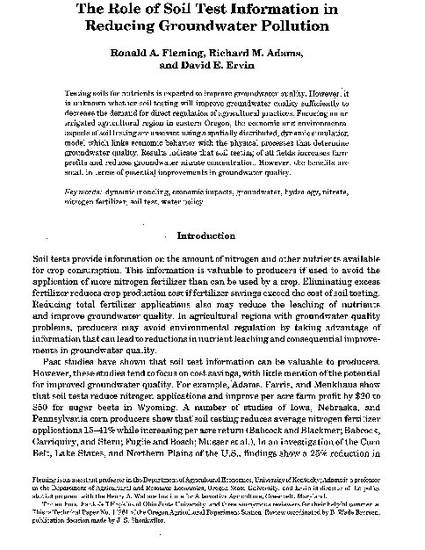
Article
The Role Of Soil Test Information In Reducing Groundwater Pollution
Journal of Agricultural and Resource Economics
Sponsor
This is Technical Paper No. 11261 of the Oregon Agricultural Experiment Station. Review coordinated by B. Wade Brorsen; publication decision made by J. S. Shonkwiler.
Document Type
Article
Publication Date
7-1-1998
Subjects
- Soils - Testing,
- Groundwater -- Pollution,
- Agricultural chemicals -- Environmental effects
Disciplines
Abstract
Testing soils for nutrients is expected to improve groundwater quality. However, it is unknown whether soil testing will improve groundwater quality sufficiently to decrease the demand for direct regulation of agricultural practices. Focusing on an irrigated agricultural region in eastern Oregon, the economic and environmental aspects of soil testing are assessed using a spatially distributed, dynamic simulation model which links economic behavior with the physical processes that determine groundwater quality. Results indicate that soil testing of all fields increases farm profits and reduces groundwater nitrate concentration. However, the benefits are small in terms of potential improvements in groundwater quality.
Persistent Identifier
http://archives.pdx.edu/ds/psu/12222
Citation Information
Fleming, R., R. Adams, and D. Ervin. 1998. "The Role of Soil Test Information in Reducing Groundwater Pollution," Journal of Agr. and Resource Economics 23(1): 20-38.

This is Technical Paper No. 11261 of the Oregon Agricultural Experiment Station. Review coordinated by B. Wade Brorsen; publication decision made by J. S. Shonkwiler. Subsequently published in the Journal of Agricultural and Resource Economics, published by the Western Agricultural Economics Association, volume 23, issue 1.